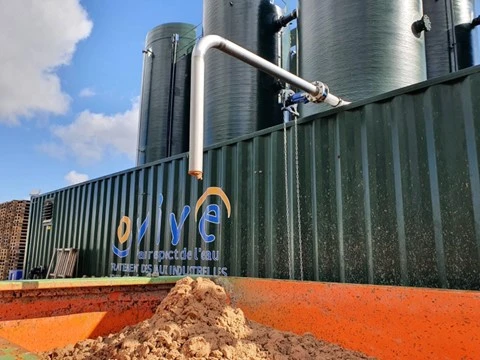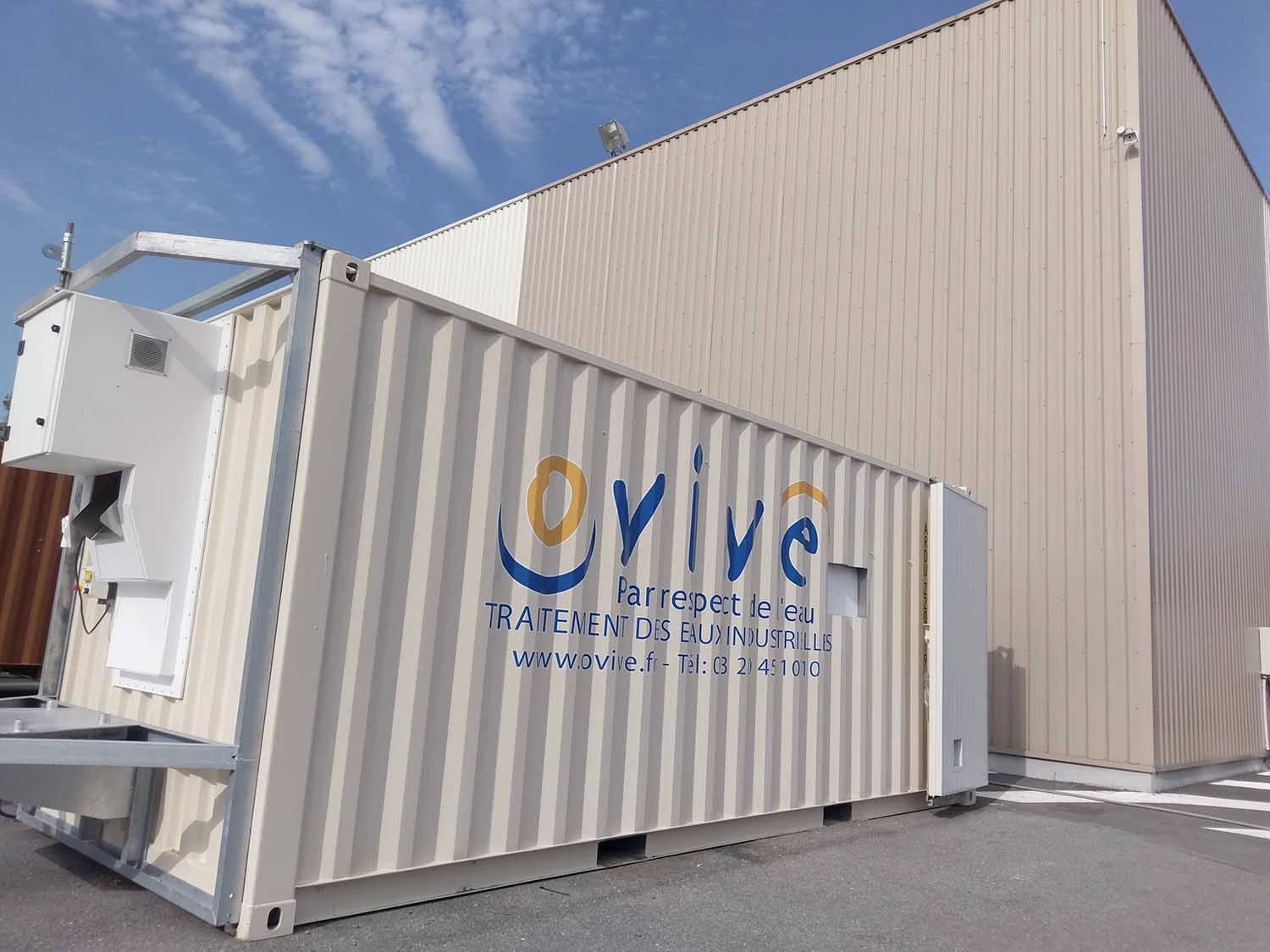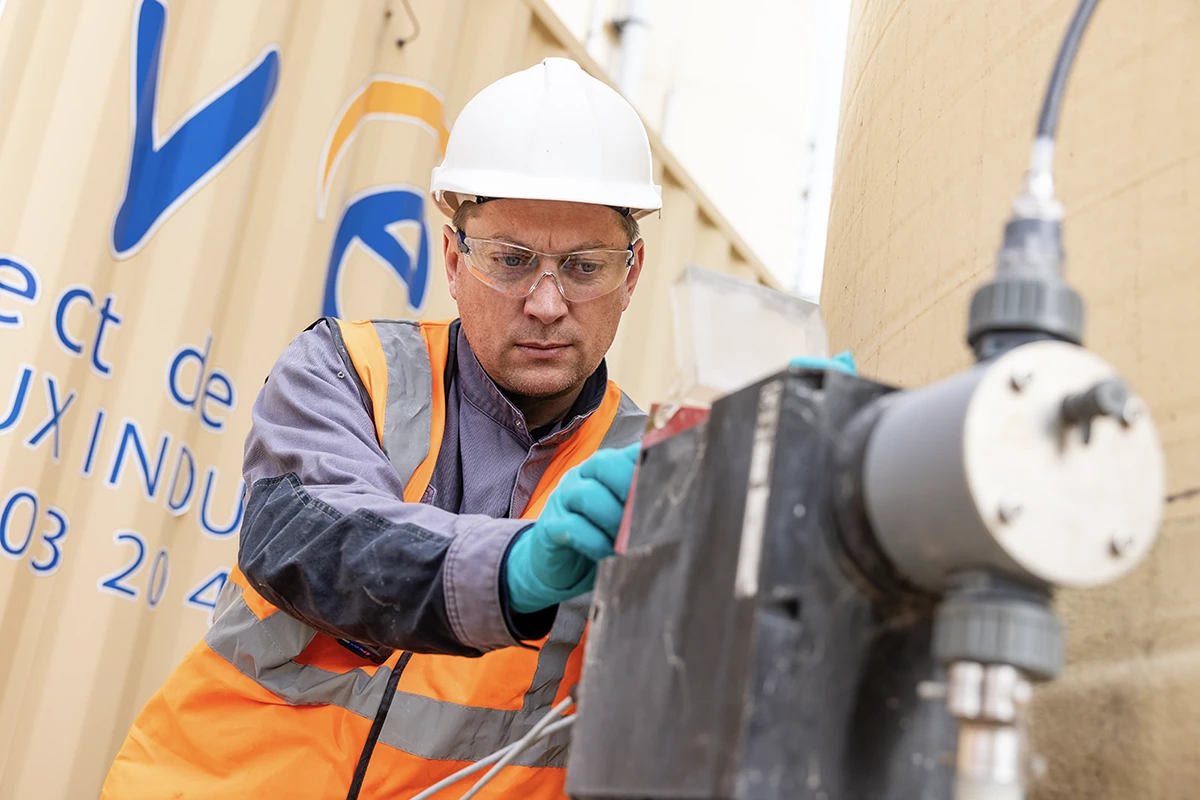Industrial sludge treatment
Optimize and secure the management of your industrial sludge and by-products with Ovive’s expertise
Benefit from Ovive’s expertise and network for the best environmental and economic recovery of your sludge and industrial by-products. On-site pre-treatment, definition and optimization of processes, logistics and compliance, Ovive is with you from A to Z.
Industrial sludge treatment: challenges and benefits
The treatment of industrial sludge is a crucial process for both public health and environmental protection, encompassing several techniques for purifying and recovering this material. Industrial sludge, which is the solid residue from wastewater treatment in industry, is treated to render it inert, dry it out and eventually recover it as a source of energy or material.
Sludge types and treatment options
Different types of sludge can be produced in an industrial water treatment process. Primary and tertiary sludge are specific to the type of industry and the contaminants present in the effluent, and therefore to the treatment used (physico-chemical, etc.). Biological sludge is produced at the biological treatment stage, where applicable, and can be recovered as energy or material.
The choice of the type of treatment to be applied depends on the nature of the sludge and the regulatory constraints in force. The quality of the sludge depends on the pollutants initially present in the effluent and the treatments carried out. This quality will have a major impact on the performance of the sludge dewatering solution, in particular depending on whether the sludge is hydrophobic or hydrophilic (biological sludge or rather primary or mineral sludge, etc.). The quantities of sludge matter to be treated (TSS) also influence the solution to be implemented. Finally, the sludge’s possible recovery or disposal channels define the intensity of treatment to be implemented (hygienization or stabilization required, minimum dryness, etc.).
Treatment methods
The main treatment methods involve initial thickening to reduce the volume of water in the sludge and obtain a more fluid sludge. This is followed by dewatering, which modifies the structure and physical state of the sludge by increasing its dryness, transforming it from a liquid to a pasty or solid state. Dewatering is often preceded by a sludge conditioning stage involving the addition of polymers. This operation ensures good separation of the water from the material.
Depending on regulatory or operational requirements, dewatered sludge may undergo additional stabilization (to reduce biodegradability and odors) or hygienization stages before it can be reused. Finally, the final stage may involve drying, incineration, composting or landfill disposal. Each of these techniques requires specific equipment such as filter presses, screw presses, centrifuges, clarifiers, dryers or incinerators.
Benefits of industrial sludge treatment
Implementing effective industrial sludge management has a number of benefits:
- Regulatory compliance: sludge treatment is often a legal requirement, particularly for companies producing large quantities of waste or effluent.
- Environmental protection: treatment minimizes the impact of sludge on the environment by limiting pollutant discharges into the natural environment and promoting waste recovery. The water recovered from sludge treatment can also be put to new uses in the process, and treated sludge can potentially be used in the production of agricultural fertilizers.
- Reduced health risks: treatment eliminates pathogens and organic or chemical pollutants potentially harmful to human health.
- Economic value: sludge treatment reduces the volume of sludge, and therefore the costs associated with its outsourcing or subsequent recovery. Sludge can also be used as a source of energy (biogas) or recyclable materials.
Adopting an industrial sludge treatment system is a virtuous process for the company, combining compliance with legal obligations, environmental protection, public health protection and optimization of resources.
Industrial sludge treatment, an industrial tool for transformation
Sludge thickening and dewatering is a crucial step in wastewater treatment. By considerably reducing the volume of sludge, this process minimizes effluent transport, disposal, storage and drying costs.
Robust, proven technologies
Ovive offers a complete range of robust, proven technologies to meet all your sludge treatment needs. Our solutions enable efficient separation of liquid phases and produce a high dry matter content. Treated sludge can then be recycled as digester feedstock for biogas production, thermal treatment and composting.
Solutions tailored to your needs
Ovive offers a range of sludge dewatering technologies to meet your specific needs. We’ll work with you to determine the technology that’s best for you, based on the desired dry solids content, available space and other requirements: K-BOX, filter press, decanter, centrifuge, screw press, reed bed…
Vision of a sustainable industry
Ovive’s vision is that of a sustainable industry, where sludge treatment is not just a regulatory constraint, but also an opportunity to improve industrial processes. By offering a wide range of sludge treatment solutions, Ovive enables companies to move towards a circular economy, where every waste product becomes a resource.
Optimization and valorization
By optimizing energy consumption and reducing waste, industrial sludge treatment can help increase the efficiency of production processes while respecting the environment. What’s more, by recovering the organic and chemical materials contained in sludge, industries can reduce their operating costs, while recovering waste. The water recovered in the sludge treatment process can also be reused in processes.
Partnership for sustainable transformation
With Ovive as a partner, industrial sludge treatment becomes not only a response to an environmental requirement, but also an opportunity for sustainable, efficient and environmentally-friendly industrial transformation.
Ovive: A trusted partner for industrial sludge treatment
Ovive is a French company specializing in the treatment of wastewater and industrial sludge. Founded in 1999, it now has over 150 plants in operation and treats more than 2 million cubic meters of wastewater per year. Backed by long-standing family know-how, Ovive supports its customers throughout the implementation of their sludge treatment solution, from initial diagnosis to start-up and follow-up.
Treatment and recovery technologies
Depending on the specific needs of each customer, Ovive offers different treatment technologies and sludge recovery processes: thickening by flotation or sedimentation, stabilization by anaerobic or aerobic digestion, dewatering by filtration or thermal drying, incineration… Each solution is designed to achieve the best compromise between efficiency, cost, reliability and respect for the environment. Specialized in industrial water treatment, Ovive offers customized support to any company wishing to implement appropriate wastewater management. Drawing on its experience and know-how, Ovive promises a solution that meets the technical and regulatory constraints specific to each business sector.
Experienced team and logistics solutions
Ovive’s experienced team is dedicated to implementing the best treatment technologies and logistical solutions for industrial wastewater management, including a range of products specifically designed for industrial sludge treatment. From coagulation-flocculation preparation systems, to thickening and dewatering systems (K-Box, centrifuge, filter press, screw press, etc.), to drying and energy recovery systems, this wide range of solutions offers the right treatment for different types of sludge and industrial waste. Our fleet of mobile units includes compact, energy-efficient sludge management solutions that can be rapidly deployed (plug’n’play) for ease of operation. Our solutions also include sludge conditioning solutions.
Monitoring and analysis
Ovive is also on hand to support companies in monitoring their industrial sludge treatment solutions. Regular monitoring and analysis of the quality of treated water and sludge ensures that systems are operating correctly and that environmental standards are being met.
Effluent management and logistics
The management and outsourcing of effluents generated on an industrial site requires tracking and logistics associated with the characteristics of the product, and in particular its hazardous nature. Ovive ensures precise tracking of effluents from their production site to the site of their recovery or disposal, in compliance with regulations governing the transport of hazardous waste and waste traceability (ADR transport, BSD waste tracking slip, Trackdéchets…). Ovive relies on a network of local and national logistics partners. This collaboration enables us to guarantee competitive transport prices to treatment facilities, and a high level of responsiveness in order to intervene as quickly as possible. Rely on Ovive for the logistics and compliance of your industrial effluent and wastewater management.
Choosing Ovive for industrial sludge treatment means opting for a solution that’s environmentally friendly, economically viable and backed by unquestionable expertise.
Case studies
Ovive’s teams
as close as possible
to your needs.
A local partner, Ovive is present throughout France with 11 branches.
Find the branch nearest you!
















